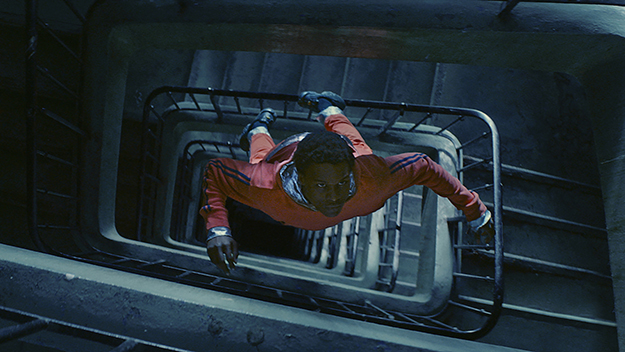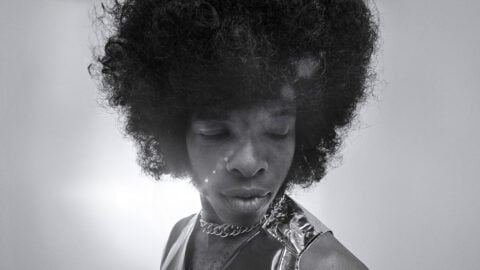Film Comment Recommends: Gagarine
This article appeared in the March 31, 2022 edition of The Film Comment Letter, our free weekly newsletter featuring original film criticism and writing. Sign up for the Letter here.

Gagarine (Fanny Liatard and Jérémy Trouilh, 2022)
Sixteen-year-old Youri (Alséni Bathily) arranges the crumbs on his plate, nudging them into the crude outline of a bird. The blink-and-you’ll-miss-it figure has a picture-book quality, not unlike the shapes a child might discern while cloud-watching or stargazing. This image of flight feels appropriate: in Fanny Liatard and Jérémy Trouilh’s banlieue drama Gagarine, both their hero and his home are named after a cosmonaut. Soviet pilot Yuri Gagarin became the first person to travel to outer space in 1961, which made him an international symbol of hope and collectivism. His namesake in the film is optimistic, too, believing he can save his crumbling apartment block from impending demolition.
That home is the Cité Gagarine, a housing project built by the French Communist Party in Ivry-sur-Seine, on the outskirts of Paris. The film opens with black-and-white newsreel footage of Gagarin inaugurating the building in 1963, cheered on by a rapturous crowd. Drawing on the estate’s real-life clearing and demolition a couple of years ago, the film depicts the gradual eviction of its long-standing tenants—most of them Black and brown immigrants—until only Youri remains, determined to stay put until the bitter end. Alone in the vast structure, Youri finds solace in a UV-lit greenhouse he has built in the building’s basement. His friend Diana (the vivacious Lyna Khoudri), a young Romani woman who lives in an encampment next door, marvels at life thriving against the odds: “Tomatoes that grow in winter?!” she exclaims.
As our hero peers out of his bedroom window through a telescope, observing his neighbors as if they were strange life forms, the Cité Gagarine becomes his spaceship and he its designated captain and engineer. He fixes the blinking light fittings and mends the broken elevator shaft. Space travel carries an implication of colonialism—the impulse to know and master an unfamiliar new world. A similar point of view often colors the banlieue genre of French movies, which commonly depict the immigrant suburbs of Paris with a self-consciously “gritty” realism and anthropological fascination. Liatard and Trouilh subvert these tropes: their visual language is more playful and less earthbound.
Cinematographer Victor Seguin depicts the Gagarine as something wondrous and alien—his camera glides through the building as though suspended in zero gravity—but his gaze does not make Others of those who live within. In one scene, Youri and Diana admire a sheet of metal punctured by holes. Beams of golden light filter in, illuminating them against a backdrop of makeshift stars. For those who know how to look, otherworldly beauty can be found everywhere.
Simran Hans is a writer and film critic based in London.







